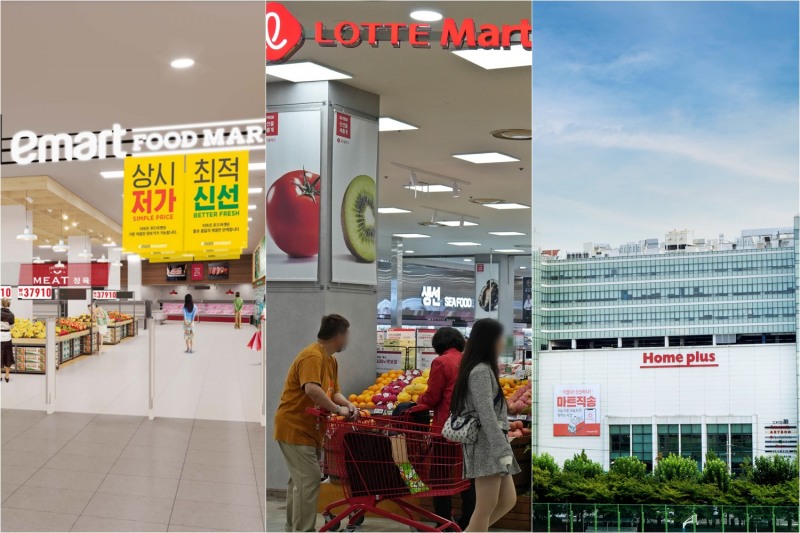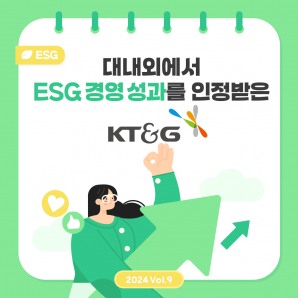
The three supermarkets have had a tough year, with sluggish consumption due to high prices and the growth of SSMs and e-commerce. /Photos courtesy of Mart, Lotte Mart, and Homeplus
이미지 확대보기In the midst of this crisis, hypermarkets have been focusing on restoring their competitiveness this year by strengthening fresh food, integration work, and price competitiveness. Although it was difficult for everyone to see the light in an environment that did not improve, E-Mart did well. E-Mart, which lost money for the first time since its founding last year, succeeded in improving its performance this year through its strategy of strengthening competitiveness in its main business.
In particular, E-Mart's strategy of strengthening price competitiveness played a big role in expanding sales. Throughout the year, E-Mart offered products at reasonable prices through its distribution know-how, including direct sourcing, bulk purchasing, and cooperation with manufacturers. In addition, E-Mart has made efforts to differentiate its products by launching pre-launch products in strategic partnership with CJ, which has led to increased sales.
In July, E-Mart and E-Mart Everyday merged in order to streamline costs to improve profitability. The resulting ‘integrated E-Mart’ created expanded purchase volumes to increase cost competitiveness and achieved operational efficiency through integrated logistics
At the same time, the company was trying to reduce costs by streamlining its workforce. In March of this year, E-Mart held its first company-wide voluntary retirement program, and in December, it held a second voluntary retirement program.
As a result, E-Mart has significantly improved its profitability this year. In the first three quarters of this year, E-Mart's cumulative sales reached KRW 12.7148 trillion, up only 1.8% from the previous year, but its operating profit was KRW 1950 billion, up 31% from the previous year (KRW 1487 billion).
E-Mart is also planning to open new stores, including those specializing in groceries, as part of its efforts to strengthen its main business competitiveness. Starting with 'E-Mart Food Market Suseong' in Suseong-gu, Daegu, which opened on the 13th of this month, it plans to open a store in Godokgangil, Seoul next year. Traders, which plays a filial role in E-Mart, is also planning to open a Magok store in the first half of next year and a Gwol store in the second half of next year or the first half of 2026.
This year, Lotte Mart experienced stable growth in the first quarter, but sales declined in the second quarter. In the second quarter, sales fell 7% year-on-year to KRW 1.3191 trillion, and operating losses widened to KRW 16.2 billion. In the third quarter, the company reported KRW 1.4421 trillion in sales and KRW 45.1 billion in operating income, down 4.9% and 11.6%, respectively. Cumulative sales for the first three quarters of the year were KRW 4.1101 trillion, down 4% from a year earlier, and operating profit was KRW 71.7 billion, down 2.4%.
However, there is also an assessment that this year's poor performance is due to a backward-looking effect. Lotte Mart, which began integration work in 2022, posted its highest operating profit in 2023 as the effects of integration began to appear.
Although growth has slowed, Lotte Mart has continued to renovate stores and special stores such as ‘Grand Grocery’ this year. It has renewed six stores this year alone, including Suwon, Uiwang, Gunsan, Jinju, Dongbusan, and Wonju. As of the third quarter, the sales growth rate of the renewed stores was 5.6%. Compared to the growth rate of -4.6% at existing stores, the effect of the renewal was significant.
In the future, Lotte Mart also plans to strengthen the competitiveness of grocery products and expand the synergy between marts and supermarkets. In addition, it plans to launch a next-generation e-grocery app by introducing the UK’s Ocado Smart Platform next year and build a customer-tailored online grocery shopping environment.
Homeplus generated KRW 7 trillion in sales by 2019, but has since fallen to KRW 6 trillion and is struggling to regain the KRW 7 trillion mark. At least, in the last fiscal year (March 2023-February 2024), the company posted sales of KRW 6.9314 trillion, which is close to KRW 7 trillion.
A large deficit are also a challenge. Homeplus has been in the red for three consecutive years. After turning deflict in 2021, Homeplus posted an operating loss of KRW 133.5 billion that year, followed by KRW 260.2 billion in 2022 and KRW 199.4 billion in 2023. The company has been steadily organizing its stores, but it has not been able to get out of the red. The net loss grew from KRW 445.9 billion in 2022 to KRW 574.3 billion in 2023.
Meanwhile, Costco Korea, a warehouse-type store, posted KRW 6.5031 trillion in sales and KRW 218.6 billion in operating profit in the most recent fiscal year (September 2023-August 2024). Although Homeplus's sales are about 400 billion won higher, Homeplus is closing stores while Costco is opening new ones, so it is expected to take second place to Costco at this rate.
In a difficult environment, Homeplus has focused on expanding customer contact in various ways by utilizing an online and offline two-track strategy. In particular, it accelerated the conversion of seven stores into mega food markets, including Gyeongju, Geumcheon, Ulsan, Cheongju, Seogwipo, Gimhae, and Jeonju Hyoja, and at the end of November, it introduced a specialized store that further evolved into 'Mega Food Market Live' at the Gangseo store.
In addition, the company recently partnered with Delivery Nation to introduce 'Mart Direct Delivery' service, the first of its kind among large marts to offer reservation delivery, and is working to enhance its online competitiveness.
Park seulgi (seulgi@fntimes.com)






























!['매각 5수' MG손보 메리츠화재 우선협상대상자 선정…완주할까 [2024 보험업계 7대 뉴스]](https://cfnimage.commutil.kr/phpwas/restmb_setimgmake.php?pp=006&w=69&h=45&m=5&simg=2024123019082105850e41d7fc6c217521479195.jpg&nmt=18)
![롯데손보 M&A, 상시매각으로 전환...내년엔 원매자 만날까 [2024 보험업계 7대 뉴스]](https://cfnimage.commutil.kr/phpwas/restmb_setimgmake.php?pp=006&w=69&h=45&m=5&simg=2024122623073300358e41d7fc6c2183101242202.jpg&nmt=18)
![보험사 실적 부풀리기에 무저해지 해지율 '메스'…업계 "지나친 가격 개입" [2024 보험업계 7대 뉴스]](https://cfnimage.commutil.kr/phpwas/restmb_setimgmake.php?pp=006&w=69&h=45&m=5&simg=2024121918381001240e41d7fc6c22115218260.jpg&nmt=18)
![권오갑 HD현대 회장 "중국이 따라오지 못하는 최첨단 선박 만들어야" [2025 신년사]](https://cfnimage.commutil.kr/phpwas/restmb_setimgmake.php?pp=006&w=69&h=45&m=5&simg=20241231143430021040d260cda7512450134.jpg&nmt=18)
![건설도 부동산도 와르르…첩첩산중 생존경쟁 펼쳐진 한 해 [2024 건설·부동산결산下]](https://cfnimage.commutil.kr/phpwas/restmb_setimgmake.php?pp=006&w=69&h=45&m=5&simg=20240730122413027735e6e69892f2208613587.jpg&nmt=18)
![2025년 한국 증시, 변수 겹겹이…코스피 '상저하고' 전망 우세 [2025 증시 전망]](https://cfnimage.commutil.kr/phpwas/restmb_setimgmake.php?pp=006&w=69&h=45&m=5&simg=2024123116243004151179ad439072211389183.jpg&nmt=18)
![은행권 생성형 AI 열전···AI 행원에 상담 서비스까지 [한금 Pick 2024 은행이슈]](https://cfnimage.commutil.kr/phpwas/restmb_setimgmake.php?pp=006&w=69&h=45&m=5&simg=2024123103092802512b4a7c6999c121131189150.jpg&nmt=18)
![한화손보, 여성보험시장 선점 우위…실적도 우상향 [2024 보험업계 7대 뉴스]](https://cfnimage.commutil.kr/phpwas/restmb_setimgmake.php?pp=006&w=69&h=45&m=5&simg=2024123008425608379e41d7fc6c211823514190.jpg&nmt=18)
![홍원학號 삼성생명, 삼성화재 DNA 이식해 건강보험 드라이브 [2024 보험업계 7대 뉴스]](https://cfnimage.commutil.kr/phpwas/restmb_setimgmake.php?pp=006&w=69&h=45&m=5&simg=2024122317290502362e41d7fc6c22115218260.jpg&nmt=18)














![[카드뉴스] 국립생태원과 함께 환경보호 활동 강화하는 KT&G](https://cfnimage.commutil.kr/phpwas/restmb_setimgmake.php?pp=006&w=298&h=298&m=1&simg=202403221529138957c1c16452b0175114235199_0.png&nmt=18)
![[카드뉴스] 신생아 특례 대출 조건, 한도, 금리, 신청방법 등 총정리...연 1%대, 최대 5억](https://cfnimage.commutil.kr/phpwas/restmb_setimgmake.php?pp=006&w=298&h=298&m=1&simg=20240131105228940de68fcbb35175114235199_0.jpg&nmt=18)
![[카드뉴스] 어닝시즌은 ‘실적발표기간’으로](https://cfnimage.commutil.kr/phpwas/restmb_setimgmake.php?pp=006&w=298&h=298&m=1&simg=202311301105084674de68fcbb35175114235199_0.png&nmt=18)
![[신간] 사모펀드 투자와 경영의 비밀](https://cfnimage.commutil.kr/phpwas/restmb_setimgmake.php?pp=006&w=81&h=123&m=5&simg=2024102809331308730f8caa4a5ce175114235199.jpg&nmt=18)
![[신간]퍼스널브랜딩, 문학에서 길을 찾다](https://cfnimage.commutil.kr/phpwas/restmb_setimgmake.php?pp=006&w=81&h=123&m=5&simg=2024102214123606876f8caa4a5ce175114235199.jpg&nmt=18)
![[서평] 추세 매매의 대가들...추세추종 투자전략의 대가 14인 인터뷰](https://cfnimage.commutil.kr/phpwas/restmb_setimgmake.php?pp=006&w=81&h=123&m=5&simg=2023102410444004986c1c16452b0175114235199.jpg&nmt=18)

![[신간] 김국주 전 제주은행장, ‘나는 시간을 그린다 1·2’ 에세이 출간](https://cfnimage.commutil.kr/phpwas/restmb_setimgmake.php?pp=006&w=81&h=123&m=5&simg=2024111517430908074c1c16452b012411124362.jpg&nmt=18)









